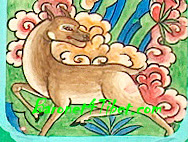Difference between revisions of "Deer"
(Created page with "thumb|250px| Here we have a single doe. The symbolic meaning is harmony, happiness, faithfulness, peace and longevity; the only attr...") |
|||
| Line 1: | Line 1: | ||
[[File:deer1121.JPG|thumb|250px|]] | [[File:deer1121.JPG|thumb|250px|]] | ||
| − | |||
| − | When two {{Wiki|deer}} are shown, it is usually the {{Wiki|male}} and {{Wiki|female}} and refers to the first [[teaching]] which [[Buddha]] gave in the [[Sarnath]] [[Deer Park]] near [[Varanasi]], where he set in motion the "[[first turning of the wheel of dharma]]." The picture to the right, two {{Wiki|deer}} facing a [[Dharma Wheel]], is a scene that one could expect to see and does see on the roofs of [[prayer]] or assembly halls in [[monasteries]] through out [[Tibet]]. | + | |
| + | |||
| + | |||
| + | |||
| + | Here we have a single doe. The [[symbolic]] meaning is [[harmony]], [[happiness]], [[faithfulness]], [[peace]] and longevity; the only attribute that may be absent would be fidelity. {{Wiki|Deer}}, by [[nature]], are extremely shy creatures, and their [[serene]] presence in a landscape represents a [[pure realm]] absent {{Wiki|fear}}. There are [[Tibetan]] tales that tell of {{Wiki|deer}} {{Wiki|species}} so [[compassionate]] that they would come and try to resolve any conflict that arose; this of course made them easy prey for {{Wiki|hunters}}. | ||
| + | |||
| + | When two {{Wiki|deer}} are shown, it is usually the {{Wiki|male}} and {{Wiki|female}} and refers to the first [[teaching]] which [[Buddha]] gave in the [[Sarnath]] [[Deer Park]] near [[Varanasi]], where he set in {{Wiki|motion}} the "[[first turning of the wheel of dharma]]." The picture to the right, two {{Wiki|deer}} facing a [[Dharma Wheel]], is a scene that one could expect to see and does see on the roofs of [[prayer]] or assembly halls in [[monasteries]] through out [[Tibet]]. | ||
{{R}} | {{R}} | ||
Latest revision as of 10:12, 6 January 2024
Here we have a single doe. The symbolic meaning is harmony, happiness, faithfulness, peace and longevity; the only attribute that may be absent would be fidelity. Deer, by nature, are extremely shy creatures, and their serene presence in a landscape represents a pure realm absent fear. There are Tibetan tales that tell of deer species so compassionate that they would come and try to resolve any conflict that arose; this of course made them easy prey for hunters.
When two deer are shown, it is usually the male and female and refers to the first teaching which Buddha gave in the Sarnath Deer Park near Varanasi, where he set in motion the "first turning of the wheel of dharma." The picture to the right, two deer facing a Dharma Wheel, is a scene that one could expect to see and does see on the roofs of prayer or assembly halls in monasteries through out Tibet.
